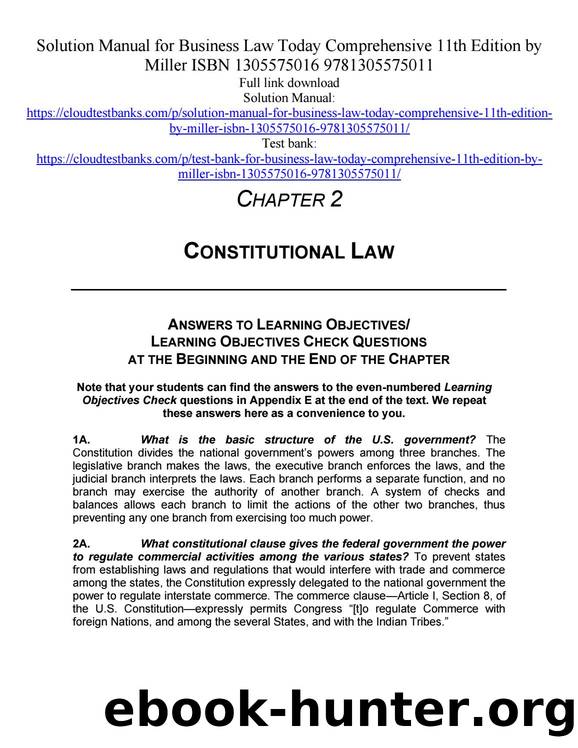The Government Class Book; A Youth's Manual of Instruction in the Principles of Constitutional Government and Law. Part I. Principles of Government ... Part II. Principles of Law .. by unknow

Author:unknow
Language: eng
Format: epub
ISBN: 9781362636816
Google: YBonvgAACAAJ
Goodreads: 59674450
Publisher: BiblioBazaar
Published: 2016-08-26T00:00:00+00:00
Chapter XLVIII.
Domestic Relations. Husband and Wife.
§1. To render a marriage contract lawful, the parties must be of sufficient age, called the age of consent; which, by the common law of the land, is fourteen years in males, and twelve in females. In some states the age of consent has been altered by statute. In Ohio, Indiana, and Michigan, it has been raised to eighteen years in males, and fourteen in females; in Illinois to seventeen and fourteen; in Wisconsin, to eighteen and fifteen.
§2. The parties must also have sufficient understanding to transact the ordinary business of life. Idiots and lunatics cannot legally contract marriage. Persons must also act freely. If the consent of either party has been obtained by force or fraud, the marriage may be declared void. The parties must not be nearly related. The degrees of relationship at which they are forbidden to marry are in some states fixed by law; but the laws of these states on the subject are not uniform. Some states have forbidden marriages which come within what is called the Levitical degrees; but these degrees have received different interpretations. According to the interpretation of some, the relation of uncle and niece and aunt and nephew, come within this rule.
§3. No person can lawfully remarry who has a wife or husband living. Such second marriage is, by the common law, null and void. In some of the states, perhaps in most of them, it is declared polygamy, and a state prison offense, except in certain cases; as when the husband or wife of the party who remarries has been long absent, and the party re-marrying does not know the other to have been living within the time; or when the former husband or wife of the party remarrying has been sentenced to imprisonment for life; or when the former marriage has been lawfully annulled or dissolved. If, however, a marriage has been annulled or dissolved for the cause of adultery, the criminal party is, in some states at least, not allowed to remarry.
§4. In some of the cases excepted in the preceding section, the second marriage is merely excusable. Although the party to such marriage is exempt from the penalty, yet if the former wife or husband is living, though the fact is unknown, and no divorce has been duly announced, or the first marriage has not been duly annulled; the second marriage is void. Where there is no statute regulation, the common law governs, which is, that nothing but death, or a decree of a competent court, can dissolve the marriage tie.
§5. The manner in which marriages are to be solemnized, and by whom, and the manner in which marriage licenses are to be obtained, or notices of marriage published, (which are required in some states,) are prescribed by the laws of the states in which such regulations exist. Marriages may usually be solemnized by ministers of the gospel, judges, justices of the peace, and certain other officers. But by the common law,
Download
This site does not store any files on its server. We only index and link to content provided by other sites. Please contact the content providers to delete copyright contents if any and email us, we'll remove relevant links or contents immediately.
| Antitrust | Civil Law |
| Emigration & Immigration | Federal Jurisdiction |
| Housing & Urban Development | Indigenous Peoples |
| Land Use | Public |
| Public Contract | Public Utilities |
| Urban, State & Local Government |
Machine Learning at Scale with H2O by Gregory Keys | David Whiting(4296)
Killers of the Flower Moon by David Grann(4045)
Oathbringer (The Stormlight Archive, Book 3) by Brandon Sanderson(3165)
Will by Will Smith(2912)
Once Upon a Broken Heart by Stephanie Garber(2851)
Guns, Germs and Steel by Diamond Jared(2366)
It Starts With Us (It Ends with Us #2) by Colleen Hoover(2350)
Borders by unknow(2304)
Friends, Lovers, and the Big Terrible Thing by Matthew Perry(2220)
The Room Where It Happened by John Bolton;(2153)
The Color of Law by Richard Rothstein(1936)
A Short History of War by Jeremy Black(1843)
The Strength In Our Scars by Bianca Sparacino(1841)
HBR's 10 Must Reads 2022 by Harvard Business Review(1840)
A Game of Thrones (The Illustrated Edition) by George R. R. Martin(1728)
Water Rights and the Environment in the United States by John Burch(1683)
515945210 by Unknown(1663)
Examples & Explanations: Administrative Law by William F. Funk & Richard H. Seamon(1642)
That Every Man Be Armed by Stephen P. Halbrook(1578)
